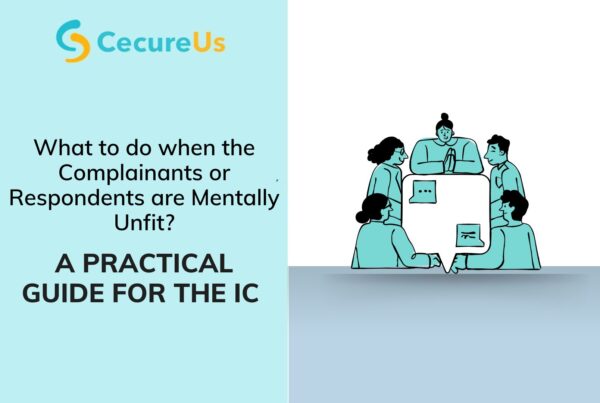
The SAFE SPACE podcast, where we explore the importance of creating safer, happier, and inclusive workplaces. In each episode, we’ll hear from industry leaders, share best practices, and tell stories of personal growth hosted by Viji Hari, the CEO of CecureUs, Author, and Speaker, specializing in the areas of Prevention of Sexual harassment (PoSH), Diversity, Equity, Inclusion & Belongingness (DEIB) and Mental Wellness across Corporates.
This Pride month, joining the very first episode of the Safe Space podcast was Chandra Duraiswamy, an expert with 27 years in marketing communications and a champion of DEI who has humanized brands, leaders, and employees. Chandra is a strategic communicator, storyteller, and NHRDN awardee. Building a culture of empathy, trust, and high performance through communication, he has joined this episode to discuss his journey and the importance of inclusion at work.
“Like Charity, Inclusion also starts at home”
Personal Experiences: The Foundation of Inclusion
Chandra shares how his personal experiences have shaped his professional path. Growing up in a joint family of 22, Chandra learned the importance of give and take, patience, and negotiation for peaceful coexistence. Inclusion was deeply embedded in his home life.
Chandra’s mother supported girls from disadvantaged backgrounds with education and life skills, while his father set up a disaster relief kitchen. Inspired by them, in the early days, Chandra has organized several medical camps and rescue support for individuals impacted by natural calamities. These lessons in inclusion naturally extended to his professional life, where he fostered a sense of community through several formal and informal interactions with his co-workers.
“Inclusion was the first lesson I was taught at home, and bringing it to work was a natural progression for me.”
Commitment to Diversity and Inclusion
Chandra’s commitment to diversity and inclusion is central to his professional ethos. He emphasizes the importance of recognizing and embracing individuals’ diverse identities—such as caste, religion, gender, faith, etc—especially in multicultural environments. During his tenure in Paris, Chandra exemplified this with simple gestures to invite conversations by sharing extra homemade lunches with colleagues, fostering connections and mutual understanding. By bringing his authentic identity to the forefront, Chandra helped uncover other marginalized and invisibilized identities, creating a broader support network.
He acknowledges a common tendency for individuals to minimize their identities to avoid discomfort in others’ presence. However, Chandra advocates for a different approach: embracing one’s own identity while actively including and respecting others. During his professional engagements with Multi-National Companies, he acknowledges the support and advocacy from his mentors who helped him translate this philosophy into action and spearhead initiatives like the Pride Network. These efforts showcased how leaders and organizations can empower diverse identities within the workplace.
Both Viji and Chandra stress the importance of using one’s influence and privilege to uplift others, a cornerstone of effective leadership.
“Culture eats strategy for breakfast” – Peter Drucker
Initiatives: “Archers of the Rainbow”
Chandra has always found storytelling to be one of the most authentic ways to build inclusive spaces. He emphasizes that an inclusive culture is crucial for the success of any organization’s strategy. Without it, these strategies are bound to fail. Even prior to the decriminalization of Section 377, he worked to promote trans inclusion by forming a network of organizations that directly engaged with the trans community to understand their real issues. This effort underscored that inclusion is a widespread challenge across corporate India, not limited to a single industry, although many organizations still do not share their strategies.
In 2020, despite the pandemic, he continued to raise awareness through online sessions for managers and employees, sharing stories of lived experiences, biases, beliefs, prejudices, and myths. Initiatives like rainbow crosswalks symbolized the commitment to pride and inclusion throughout the year. Chandra also broadened the focus to include stories of other minorities, such as women, individuals with physical disabilities, and veterans, highlighting their often-overlooked experiences.
He encouraged employees to become storytellers, enacting plays that brought attention to workplace biases and fostered sensitivity. Over three years, Chandra’s efforts aimed to create an inclusive ecosystem within organizations, involving customers and suppliers. This approach ensures that strategies are effective and sustainable, leading to more equitable workplaces.
Conclusion
Chandra emphasizes the importance of inclusion, believing that organizations should hire diverse candidates across various roles and support their growth through initiatives like internships and CSR programs. Essential policies and infrastructure, such as gender-neutral restrooms that are also disability compliant, play a crucial role. To foster active participation, inclusion should be a KPI for all employees, from interns to CEOs.
Chandra also highlights the importance of allyship, where employees start as bystanders, become allies, and eventually activists. He stresses the significance of using Pride Month to learn more and adopt inclusive language as the first step toward making every day a day of pride.
The first episode of the SAFE SPACE podcast lays the foundation for future discussions on creating inclusive workplaces, sharing inspiring stories, and offering practical tips for both organizations and employees. Stay tuned for more!
Please reach out to us for any queries on Pride Inclusion At Workplace.
For more blogs and articles, visit our official website. Contact us for workshops and queries related to POSH, EAP (Employee Assistance Program,) and Diversity and Inclusion.




